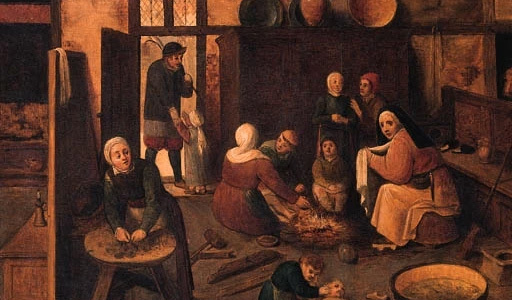The perception of household staff has changed drastically throughout history. Household staff members have contributed to helping families grow and thrive throughout the years. Historically they are the backbone of many strong family units. In this article, we will have an in-depth look into staff members’ history from ancient times through the Medieval and Renaissance periods. Here is a glimpse into the history of household staff members and how they have aided families during ancient times:
Household Staff Members in Ancient Egypt
In Ancient Egypt, household staff members were a common feature in affluent households. These staff members performed various tasks, including cooking, cleaning, laundry, gardening, and caring for children. This allowed families more time to work and do leisure activities. Some households would have specialized staff like tutors, musicians, and personal attendants. Just as we have personal assistants today that aid with the smooth running of everyday life and help navigate different situations.
Household Staff Members in Ancient Mesopotamia
In Ancient Mesopotamia, society contains different social classes, and household staff members are the essential role in the households of the elite. Like today, these staff members would carry out tasks such as cooking, cleaning, and tending to livestock. It was common for staff members during these times to manage agricultural or business aspects of the household. This is just like today’s version of a house manager, who oversees different parts of the home, such as other staff members and the organization of activities.
Household Staff Members in Ancient Rome
In Ancient Rome, wealthy households had a more significant number of domestic staff members. The more affluent or well-off families had a hierarchy among the staff, with roles like an overseer, who would manage the other household staff. This is also like today’s version of a house manager who would do the same and oversee most activities that were occurring in the household. This individual has more power or influence over the other staff members.
There are many similarities between the roles of today’s household staff and the household staff members of ancient times. However, today’s staff have more protection and rights than ancient staff members. These staff members’ responsibilities can be extraordinarily similar to many of the positions we have today.
Furthermore, during the Medieval and Renaissance periods, staff members continued to play significant roles in noble households. We will take a look into the similarities between today’s staff and the role that they played during these different periods.
Household Staff Members during the Medieval Period
The Medieval period had a feudal system where powerful landowners, such as lords or knights, controlled large estates. These large estates, also called manors, were the center of economic and social life, and domestic staff played a vital role in its operation. Many of the staff during this period were serfs or peasants who would work in these manors. These members are tied to the land and have to provide different services to the lord of the manor.
The staff during this time did not have the same rights or protections that household staff members have today. Today, laws protect workers’ rights, such as minimum wage, holiday pay, and many more. These staff members, while they had similar roles, would have little to no protection rights. Many staff members would do the same tasks as today’s version of a nanny, house manager, tutor, and personal assistant, but with different titles. These individuals would help provide services for the family so that the family members could focus on politics, warfare, and other personal activities.
Household Staff Members during the Renaissance Period
The Renaissance period was slightly different from the Medieval period as there was a shift in the social structure. This period had a rise in the wealthy merchant class, which introduced more culture and skilled staff into the society. This outcome was that staff members are expected to specialize in a specific role. Furthermore, professionalism in staff is highly valued during this time. This is where we see the start of more trained and educated household staff members, as it displayed the image of wealth and sophistication during that period. Additionally, a revival of humanistic values during this period led to better staff treatment.
During this period, we can see a shift in the treatment of household staff members. They are given more responsibility, tools, and opportunities. This is an excellent change from the previous periods when staff was not given much thought or care. We can see this results in how today’s staff members are trained and cared for. Presently, staff members are expected to be well trained, have an education, and be well-spoken. This is similar to the expectation they had during the Renaissance period. Furthermore, during the Renaissance period, there was an introduction of humanistic values that started to promote staff welfare. We can see the start of more protection and fundamental rights for all staff members during that time. Today, staff have employee rights such as minimum wage, work hours, and paid breaks. There is a connection and influence between the history of household staff members and current staff members. The evolution and treatment of staff can be seen as constantly growing and changing while maintaining the connection of similar responsibilities and tasks for families.
Nomenial
At Nomenial we value and appreciate all of our household staff members, we also understand that this industry is ever changing and constantly growing. With that in mind, we make sure to maintain flexiblilty, consideration, and adaptivity when working in this industry.







